When it comes to RISC-V based SoC, SiFive has always set a benchmark in the RISC-V ecosystem. On 29th October 2020, SiFive confirmed the first-ever RISC-V PC.
After an increased demand for AI-focused RISC-V microarchitecture, targeting all applications from artificial intelligence, the internet of things, high-performance computing, and now even desktop PCs. SiFive Freedom U740 powered HiFive Unmatched mini-ITX motherboard comes with a complete development environment which allows developers to create RISC-V based applications from bare-metal to Linux-based systems.
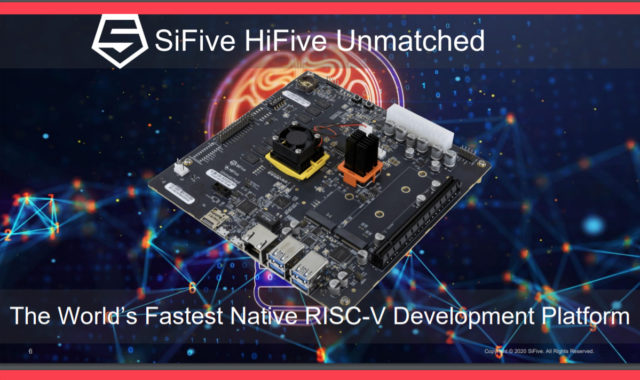
“HiFive Unmatched ushers in a new era of RISC-V Linux development with a platform in a PC form factor. Powered by the SiFive Freedom U740, a high-performance multi-core, 64-bit dual-issue, superscalar RISC-V processor.”, SiFive says. It is the world’s fastest native RISC-V development platform.
SiFive HiFive Unmatched Board
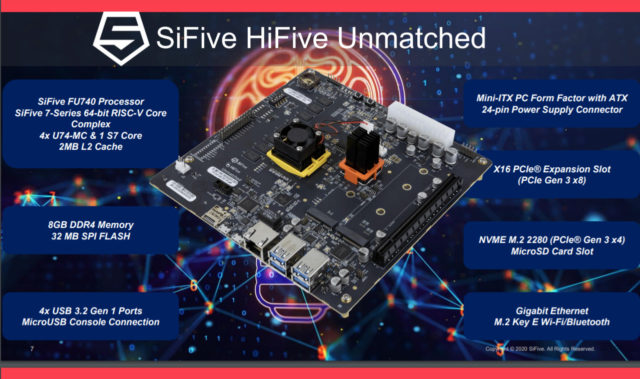
At the heart of the SiFive board is a SiFive FU740 processor coupled with 8 GB DDR4 memory and 32 MB SPI Flash. It comes with a 4x USB 3.2 ports and a 16x PCIe expansion slot. The mini-ITX standard form factor makes it easy to build a RISC-V PC.
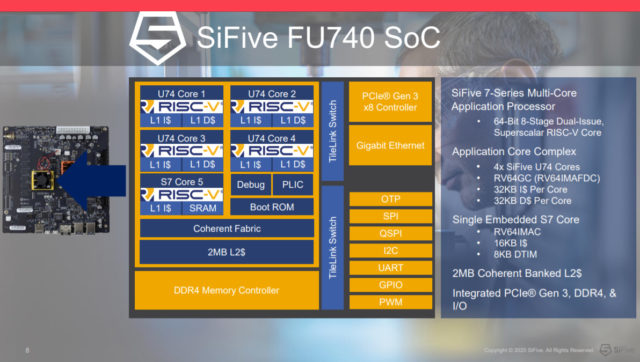
You can here see there is a total of four U74 cores with one S7 core. There is something called the mix-match configuration allowed wherein you can combine S2 core, S7 core combined in the SiFive FU740 using SiFive Mix+Match technology. This combination offers a homogeneous/heterogeneous multi-core complex that offers a potent combination of application and real-time processing.
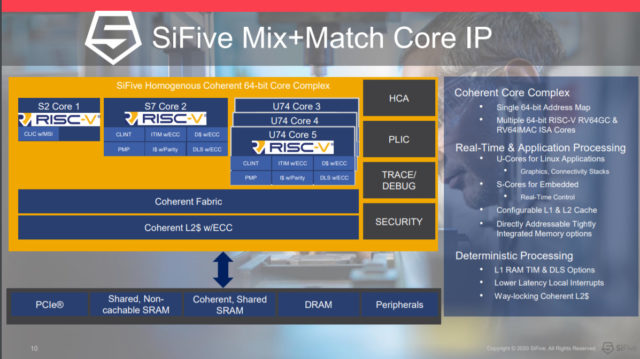
The product will be shipped at 1.4 GHz but developers can up the frequency up to 1.5 GHz. Overclocking is not advisable, but some people will always try. On the HiFive board, you can run an emulated version of virtualization. You can use the PCIe general-purpose slot (PCIe Gen 3 x8) for the graphics card and since Linux driver support is available today.
SiFive Freedom U Software SDK
Both the HiFive Unmatched and earlier Unleashed boards come with Freedom U SDK support based on Yocto/OpenEmbedded. The SDK allows you to build your own custom Linux distribution and comes with U-Boot, OpenSBI, U-Boot SPL all packaged together and released under an open-source license.
Debian support for RISC-V has grown over the past few years with ~95% of packages ported to RISC-V, and Fedora distribution also supports (U)EFI. Both operating systems should run well on either HiFive board.
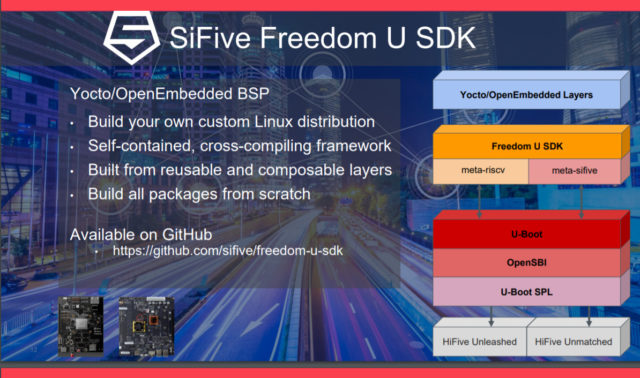
Q&A
Question (Abhishek Jadhav): RISC-V being an open-source ISA, what happens when we see RISC-V based PCs for customers? Do they pay a royalty to SiFive to make the board/SoC?
Answer (Dr. Yunsup Lee, CTO, and co-founder at SiFive): “SiFive has a pretty clean IP business model where there are license and royalty associated with the IP that works with our partners so it would have been too different from what people can see in the market to use RISC-V PCs. RISC-V specifications are free and open specifications. In other words, the other competitors have something called an architectural license and you have to pay fees to get access to the architecture license to build your own cores. So, one way to think about RISC-V is that everyone gets a free architecture license.”
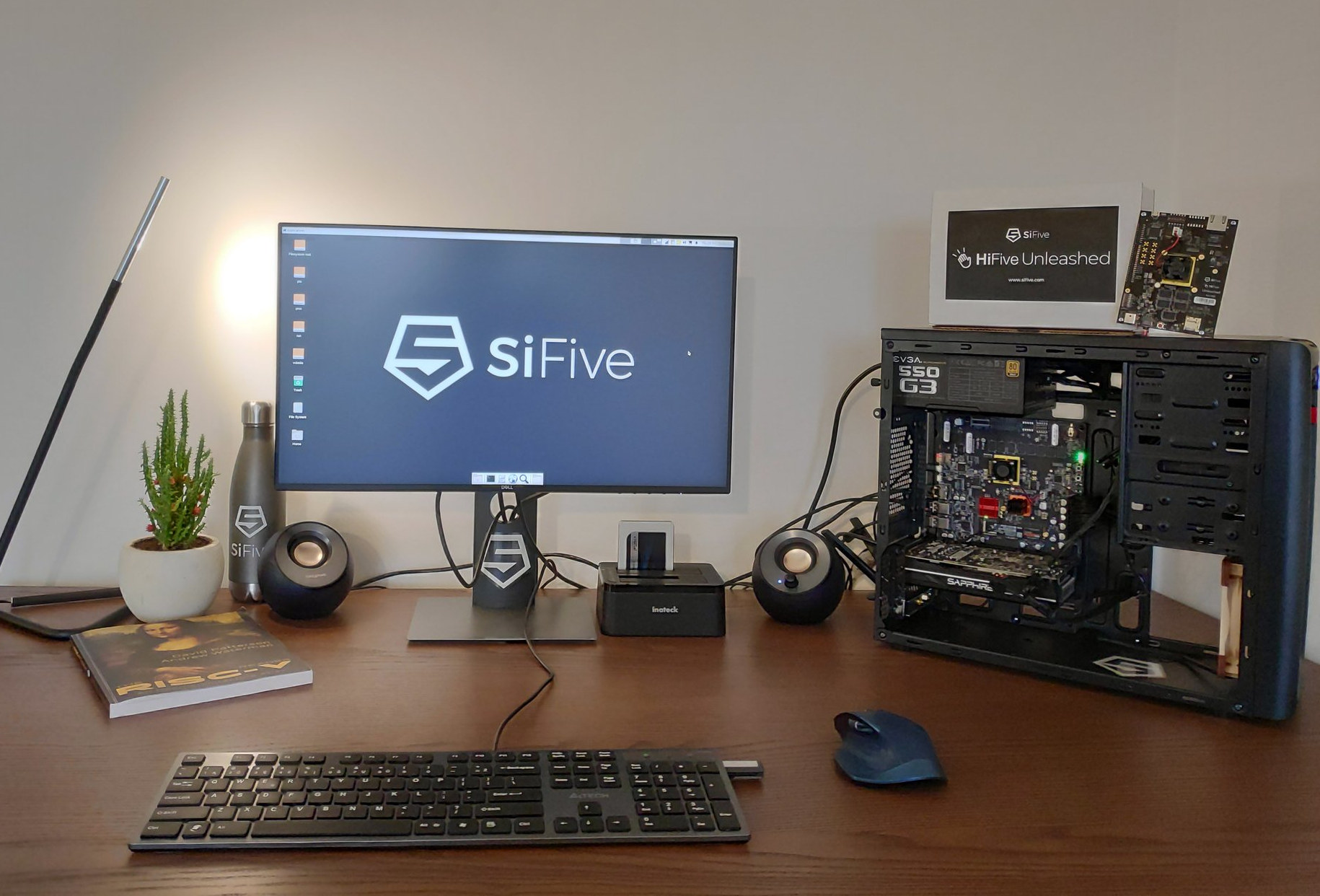
Conclusion
SiFive Unmatched board will be available by Q4’20 for USD 665, and you can already register your interest. You will get a mini-ITX board, 32 GB MicroSD, and 3-meter CAT5e ethernet cable. SiFive did not speak on the commercial aspect of the product but are very confident about future development. Android and Chrome support is something we can see in the future. The product looks promising and we are excited to see future development in the RISC-V PC ecosystem.
Presentation slides are available here.

Abhishek Jadhav is an engineering student, RISC-V Ambassador, freelance tech writer, and leader of the Open Hardware Developer Community.
Support CNX Software! Donate via cryptocurrencies, become a Patron on Patreon, or purchase goods on Amazon or Aliexpress






> SiFive Unmatched board will be available by Q4’20 for USD 665
Lets see it benchmarked against the ODROID-N2+ (USD 79) first.
The perf will be on rpi3 level. 4-core dual-issue in-order, that’s like rpi3’s A53. Also freq. is similar. No hidden surprises here IMHO.
The question then becomes: what does one do with PCIe3x4 M2 and PCIe3x8 expansion with only PCIe3x1 WIFI and Ethernet 1GB I/O to the world – all powered by a RPi3?
The CPU is RV64GC. There is no SIMD, AI, or even AES acceleration (or video ISP/encode/decode hardware for AI use). The lack of processing capability implies that all “real work” will be done by whatever is in the PCIex8 or USB3 slots while the CPU plays the role of “smart” DMA. I am genuinely curious what real-world scenario this targets.
My initial thought was this targeted those weary of import/export restrictions on technology. However, it appears that SiFive is also an American company.
This is board for *professional* RISC-V developers. It’s not intended for yet another embedded hobby project. Its price shows that too. So if you are fed up by running linux on risv-v qemu emulation on your fast xeon/ryzen then you may consider this board to see if it’s faster or slower than your current setup. Also it may not be a replacement, but rather complimentary to the current risc-v/qemu state of affairs…
>Lets see it benchmarked against the ODROID-N2+ (USD 79) first.
These are totally different things. The ODROID-N2+ is a mass produced board targeted at the unwashed masses.
A board like this is more likely to be bought on the companies credit card as a research expense.
$700 isn’t too bad for a board like this especially when you consider that an FPGA board that can simulate these cores at much lower frequencies is going to be many times that.
That is not the point of the board. It is designed to be a research product. A development platform for companies working with RISC-V. And there are a lot of big names in the game. This is a great progress and we will soon see some RISC-V ICs in end-products. Looking forward to it. Especially considering nvidia just bought ARM and is not well known for their open source efforts.
https://www.youtube.com/watch?v=iYWzMvlj2RQ
The NVIDIA Arm deal is not done yet, and pending various governments’ green light. I have the feeling it will not happen, just like Qualcomm buying NXP.
I think the deal not going through might actually be a worse outcome.
It’s obvious softbank want rid of it now so if it doesn’t go to nvidia it could up with someone much worse.
What would be a worse outcome? Going bankrupt?
Oracle
Getting bought by another non-semiconductor company that doesn’t understand how ARM makes it’s money (just like softbank didn’t) and ends up ruining the company in the process.
Well, AMD is on a buying spree. 😉
Im still hoping for their U84 core to be released
Just have to hope PicoRio SBC will be affordable.
It was just launched at crowdsupply
Update Dec 9, 2020: RAM has been upgraded to 16GB, and shipping pushed back to Q1 2021
People have started to receive their board. It looks beautiful.
https://twitter.com/carlosedp/status/1369352368735797263/photo/1